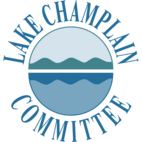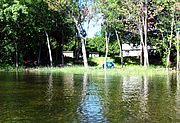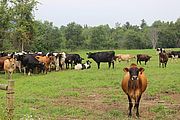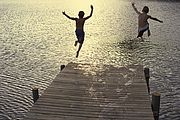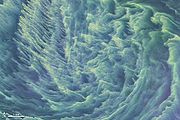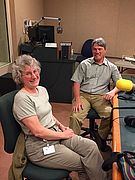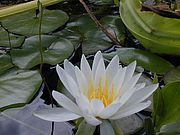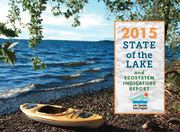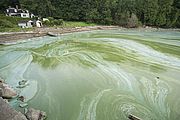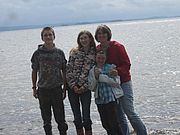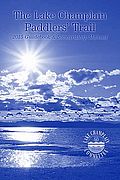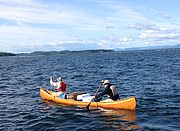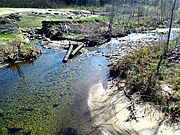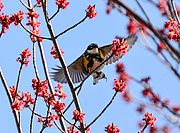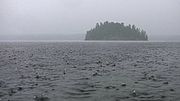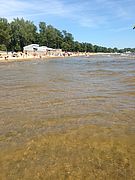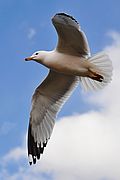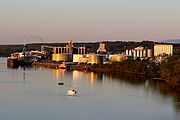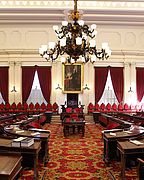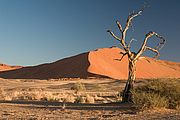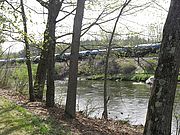In order to address lake shore erosion issues you first have to know what is causing the erosion. It is easy to look at the broad expanse of the lake and assume the crashing waves are the source of the problem, even when it’s not true. Read...
News from Selected Month
Vermont Public Radio took an in-depth look at pollution sources and solutions in their recent Downstream series. Read...
As part of Vermont Public Radio's attention to water, LCC Staff Scientist Mike Winslow provided the following commentary for the station, which you can listen to on-line. Read...
Algae blooms have become common across the country and across the world. While some of the places they are appearing have a history of nuisance levels, in other places the blooms are considered new or rare. Read...
LCC has been working hard to educate the public about blue-green algae. For years now we have offered algae monitor training sessions to instruct anyone interested in how to distinguish blue-green algae from other floating phenomena and what the health risks are of exposure to blue-green algae. Read...
The white water lilly (Nymphaea odorata) is surely reason enough to paddle in quite still waters. The plant grows in ponds, lakes, slow stream and ditches from Newfoundland to Saskatchewan and south to Central America. Read...
Read about the Burlington Pharmaceutical Survey, the return of Lake Sturgeon, flood damages in Central VT, endangered species and more! Read...
The Lake Champlain Basin Program released their 2015 State of the Lake report on June 30. The report states that, “although water quality trends in Lake Champlain are cause for concern. . .more than 85% of Lake Champlain’s water is consistently of excellent quality and another 13% of the water is usually in quite good condition. In the remaining 2% of the Lake, conditions are seasonally alarming... Read...
For the second time in seven years a Vermont town has lowered the assessed value of lakeside property due to pollution, according to Vermont Public Radio. In both cases, the towns in question were located on St. Albans Bay where blue-green algae blooms routinely develop during the summer. Read...
LCC Executive Director Lori Fisher spent a few days in Washington DC last month with colleagues from the America's Great Waters Coalition. Organized by the National Parks Conservation Association and the National Wildlife Federation, the Coalition includes representatives from the Chesapeake Bay, the Great Lakes, Everglades, Puget Sound, New York/New Jersey Harbor, the Gulf of Maine, and Mississippi River, Lake Champlain and other great waters across the nation. Read...
Mega retailer Walmart was fined $98,000 by New York State for selling phosphorus fertilizer without appropriate signage. As a result, and to avoid future such fines, Walmart has agreed to remove all phosphorus lawn fertilizer from its store shelves. The law restricting the use of phosphorus fertilizer on lawns went into effect in New York in 2012. Read...
Hats off to the great group of dedicated blue-green algae monitoring volunteers who are reporting on water quality from over 80 Lake Champlain shoreline locations, six sites on Lake Carmi and one on Lake Iroquois. LCC has trained over 300 individuals this season to identify blue-green algae, including state and municipal recreational staff and water treatment system operators. Read...
The 2015 edition of the Lake Champlain Paddlers' Trail guidebook is out! It’s jam-packed with helpful information for great adventures on the water including site descriptions and chartlets for 43 Trail locations (with access to over 600 campsites), launch site listings, natural history articles, safety and stewardship tips, equipment check lists and more! Read...
In late June, LCC members John Little and Jim Wakefield headed down the lake in a handcrafted canoe on a paddle to New York City. Both are science teachers and experienced outdoorsmen, and they have paddled many waterways together. Below is John's account of the first leg of their journey. Read...
Ponds can be an aesthetic addition to a property, but they also pose a danger during times of flooding. Ponds built within floodplains become magnets for rising waters. Streams can “capture” the pond which then exacerbates downstream damage when the pond blows out. Read...
Few of us like picking up dog poop. For many dog owners it's the least favorite task of pet ownership. Pet poo may seem benign but those left behind stools are nasty to step in and bad for waterways. Pet waste contains disease-causing bacteria, viruses, and lots of excess nutrients that can close a beach to swimming, trigger weed and algae blooms, and foul water. Read...
In May, more than five thousand people joined in the Way to Go Smart Trip Challenge and chose healthier, more earth-friendly transportation alternatives to driving alone. Together these commuters saved at least 300,773 miles, 12,215 gallons of gasoline, and over 110 tons of carbon. Read...
May is always a wonderful month for bird-watching along Lake Champlain. Migrants stream along the shores and wetlands as they wing their way to breeding grounds in the region and points north. Read...
Just wait a minute; it will change. In our <link learn news item nature-note-lake-level-low>last Enews we noted how low the lake had been for a prolonged time. What a difference a month makes. June rainfall set records in some parts of the Champlain Basin and the lake level is now well above average for this time of year. Read...
Sand and waves, suntan lotion, bathing suits, a child’s plastic pail and shovel for building castles. Spending a day at the beach is a long standing summer tradition, but did you ever wonder why there aren’t more beaches? Why do beaches form along some coves on Lake Champlain but not others? Read...
Ever notice the amount of time gulls can spend floating over the lake without flapping their wings? On a windy day, they use up flowing drafts of air caused by waves to stay aloft. Wind is slower near the water surface due to friction and the higher you are above water, so sometimes you will see a bird speed rapidly away as it increases elevation. Read...
Regatta for Lake Champlain and Lake Champlain Open Water Swim details! Read...
Read more about On-Line Boater Safety Courses, New Lake George Septic Regs, Bottled Water E. Coli Contamination, Early Algae Blooms in Wisconsin, and Massive Algae Bloom off West Coast. Read...
On May 21, the New York State Department of Environmental Conservation (NY DEC) announced its intent to rescind a Negative Declaration and Notice of Complete Application for an air pollution permit in the Port of Albany. Global Companies LLC of Massachusetts had sought a state air pollution permit modification so it could install an oil-heating facility. Read...
In July of 2013 LCC lamented that it might take at least six months before a study of invasive species barriers in the Champlain Canal at the southern end of the lake might begin. The delay has been significantly more than six months and it is now unclear when any study will begin. Read...
Before adjourning for the year the Vermont House and Senate agreed on the terms of a key water quality bill. The legislation was a major LCC priority and we thank Governor Shumlin, Vermont environmental agencies, legislators and activists that helped bring the water quality bill to fruition this session. Read...
For eight of the last nine months the lake level has been below average level (based on the average from 1970 to 2011). The only break in the period since last September has been a wet spell in January, but by the end of that month the lake had once again receded. During spring runoff, the lake usually reaches about 98.5 feet above sea level. Read...
Love the water? Join in an informative, engaging celebration of lakes at the Vermont-hosted New England Chapter of the North American Lake Management Society Conference (NEC NALMS). The NEC NALMS Conference will take place in Burlington, along the shores of Lake Champlain at the Main Street Landing and Performing Arts Center in Burlington, VT on May 29 and 30. Read...
Read more about the new Lake Champlain Gage, Great Lakes Scientists Gathering in Burlington, Lake Flooding Studies, Trout Stocking, and Toxic Driveways! Read...
The Lake Champlain Committee and three conservation organizations from the Adirondack Park and Champlain Valley praised a decision by the NYS Department of Environmental Conservation (DEC) to rescind its 2014 decision not to require a full environmental impact statement from a company seeking permission to import heavy crude oil from Canada. Read...
